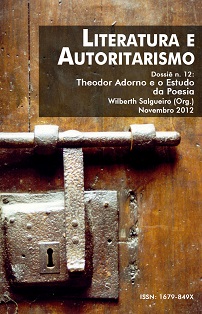On Adorno's concept of 'epic naïveté'
DOI:
https://doi.org/10.5902/1679849X72358Keywords:
Adorno, Epic ingenuity, Enlightened reasonAbstract
In 1958, Theodor W. Adorno published the first volume of Notas de literatura, which included the essay "Sobre a ingenuidade épica”, written in 1943 as part of research for work produced with Horkheimer, Dialética do esclarecimento. Not by accident is that the concepts developed in this work may elucidate the notion of epic ingenuity presented in the short essay of 1943. In this article, I will analize the adornian concept of “epic ingenuity” in the light of the relationship between myth and reason developed in Dialética do esclarecimento. The contradiction in the epic discourse between the myth and linguistic register is presented as the reflexive principle which allows associations with the discourse of enlightened reason: both discourses intend, through objectivity, to dominate the unknown, lessen the fascination and fear caused by the obscurity. However, they are different because the epic discourse adheres to the particular, whereas the enlightened reason adheres to the universal. The criticism directed to the enlightened reason by the epic ingenuity results from that difference, since the epic discourse, proposing himself as a fiction and abstaining from the classificatory logic, associates concept and object to produce an image of the real.
Downloads
References
ADORNO, Theodor W.; Horkheimer, Max. Dialética do esclarecimento: fragmentos filosóficos. Trad. Guido A. de Almeida. Rio de Janeiro: Jorge Zahar Ed. 1985.
ADORNO, Theodor W. Notas de literatura I. Trad. Jorge M. B. de Almeida. São Paulo: Duas Cidades; Ed. 34, 2003 (Coleção Espírito Crítico).
ARISTÓTELES. Poética. In: _____; Horácio; Longino. A poética clássica. Trad. Jaime Bruna. São Paulo: Cultrix, 1997, p. 19-52.
BENJAMIN, Walter. O narrador: considerações sobre a obra de Nikolai Leskov. In: _____. Magia e técnica, arte e política: ensaios sobre literatura e história da cultura. Obras escolhidas, vol. 1. Trad. Sergio Paulo Rouanet. São Paulo: Editora Brasiliense, 1987, p. 197-221.
HOMERO. Odisseia II: o regresso. Trad. Donaldo Schüler. Porto Alegre: L&PM, 2007.
LUKÁCS, Georg. Teoria do romance: um ensaio histórico-filosófico sobre as formas da grande épica. Trad. José Marcos Mariani de Macedo. São Paulo: Duas Cidades; Ed. 34, 2000 (Coleção Espírito Crítico).
OLIVEIRA, Luís Inácio. A dialética do mito e do esclarecimento e o sacrifício de Ulisses. In: _____. Do canto e do silêncio das sereias: um ensaio à luz da narração de Walter Benjamin. São Paulo: EDUC, 2008, p. 135-166.
RODRIGUES, Antonio Medina. A Eneida virgiliana entre a vivência e a narração. In: Virgílio. Eneida. Trad. Odorico Mendes. Cotia, SP: Ateliê Editorial; Campinas, SP: Unicamp, 2005, p. 9-29.
SCHILLER, Friedrich. Poesia ingênua e sentimental. Trad. Márcio Suzuki. São Paulo: Iluminuras, 1991.
Downloads
Published
Versions
- 2023-10-15 (2)
- 2012-11-15 (1)
How to Cite
Issue
Section
License
DECLARAÇÃO DE ORIGINALIDADE E EXCLUSIVIDADE E CESSÃO DE DIREITOS AUTORAIS
Declaro que o presente artigo é original e não foi submetido à publicação em qualquer outro periódico nacional ou internacional, quer seja em parte ou na íntegra. Declaro, ainda, que após publicado pela Literatura e Autoritarismo, ele jamais será submetido a outro periódico. Também tenho ciência que a submissão dos originais à Literatura e Autoritarismo implica transferência dos direitos autorais da publicação digital. A não observância desse compromisso submeterá o infrator a sanções e penas previstas na Lei de Proteção de Direitos Autorais (nº 9610, de 19/02/98).






